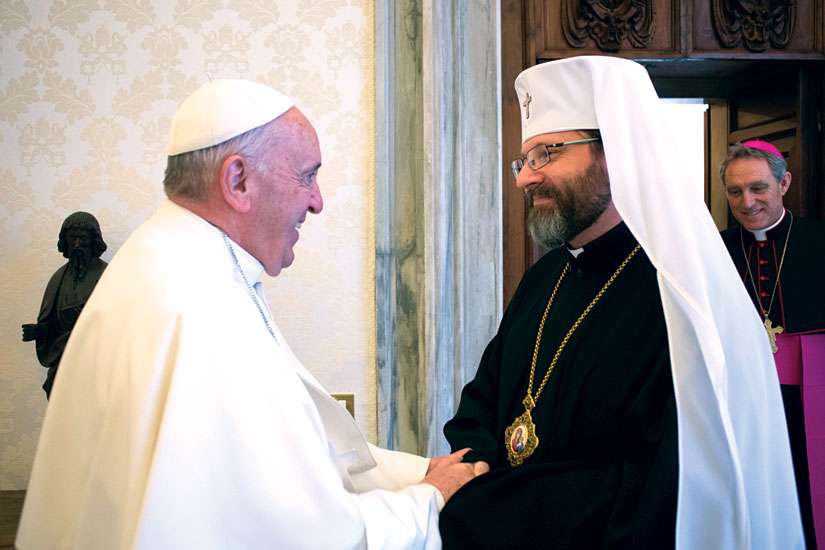The patriarch’s visit has two purposes. On Wednesday there will be a dinner marking the transfer of one of the UGCC’s most important academic institutions, the Metropolitan Andrey Sheptytsky Institute of Eastern Christian Studies, from Saint Paul University in Ottawa to the University of St. Michael’s College in Toronto. On Saturday, Patriarch Sviatoslav will consecrate the new St. Elias Church in Brampton. St. Elias was destroyed in a fire on April 5, 2014.
The visit gives us the blessed opportunity to stand in solidarity with our fellow Ukrainian Catholics, suffering so much in these last years at the hands of their Slavic brothers in Russia. The invasion and annexation of Crimea in 2014, as well Russian forces present in Ukraine to foment violence and war, have taken a heavy toll on all Ukrainians, but especially those of the minority UGCC. The acquiescence of the western countries — Canada was a notable exception — to the invasion of Ukraine made the situation more dire and more painful.
For Ukrainian Catholics, the lack of robust support from the Vatican has also seemed like a betrayal. The visit to Canada then is an opportunity for Catholics here to embrace and strengthen our Ukrainian brethren.
The vibrancy of the UGCC is one of the most hopeful stories of recent decades. Reduced to a small, aging clergy by nearly 50 years of Soviet totalitarian atheism and brutal persecution, the resurrection of the UGCC has been remarkable. In 1989, there were only about 300 priests left in the UGCC, whose average age was about 70. Today, there are some 3,000 priests, with an average age of 38. (The patriarch himself is only 46.) There are 800 seminarians for five million Ukrainian Greek Catholics globally. The visit of Sviatoslav to Canada is an occasion to celebrate God’s mighty works, manifest in our time, in the UGCC.
The visit is also an opportunity to firmly and fraternally say in Canada what is difficult, for diplomatic and ecumenical reasons, to say in Rome. The solidarity we owe to the heroic UGCC is not only in the face of aggression from the Russian state, but also in the face of the Russian Orthodox Church, which has justified the presence of Russian troops in Ukraine and questions the very existence of the UGCC.
In September, the ecumenical meeting in Assisi of the leaders of world religions was an occasion of laudations for the titular head of the Orthodox Church, Bartholomew, Patriarch of Constantinople, for his 25 years of ecumenical work. Last week there was an important statement signed by representatives of the Catholic Church and the Orthodox Church in Chieti, Italy, on the shared history of the first Christian millennium. Yet not all is well on the Catholic-Orthodox front, as even the Chieti meeting was used by the Russian Orthodox Church to denounce the UGCC.
“Metropolitan Hilarion drew the attention of the Commission to the actions of leaders of the Ukrainian Greek Catholic Church, inadmissible in Christian ethics,” read an official statement of the Russian Orthodox Church. “We can hear the statements made by the UGCC Supreme Archbishop Svyatoslav Shevchuk, which go against the line of our dialogue, create obstacles on its way and sow distrust between the Orthodox and the Catholics.
“There was a meeting between Pope Francis and Patriarch Kirill in February in Havana. For our Church it was a historic event since the Pope and the Patriarch have never met before. We believe it was a very good meeting as it opened a new page in our bilateral relations. However, immediately after it finished it was heavily criticized by the Ukrainian Greek Catholics and not by some group of the faithful but the UGCC leaders themselves. It was not just criticized but there were many insults and unfair attacks.
“We have to understand that there are people in our Churches who create obstacles on our way, and we have to bear it in mind when we speak about the future of our dialogue.”
That is pure propaganda of a dated Soviet-era sort, and unbecoming from the Orthodox bishop charged with his church’s external relations. The Vatican, desiring good relations with the Patriarchate of Moscow, pretends not to notice when the Russians speak this way. In Canada, where Ukrainian Catholics have been such an important part of our national history, we ought to have no such reticence. Our welcome for His Beatitude Sviatoslav ought to be fulsome and sincere, the blessing of brothers dwelling together in unity!
(Fr. de Souza is the editor-in-chief of Convivium magazine: www.conviviummagazine.ca.)


